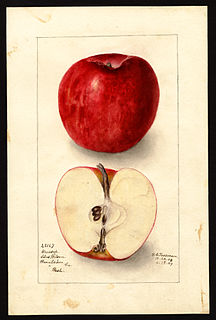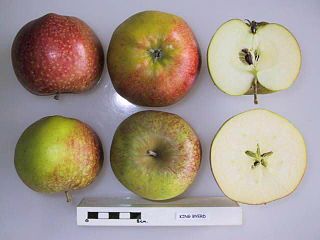Perry, also known as pear cider, is an alcoholic beverage made from fermented pears, traditionally the perry pear. It has been common for centuries in England, particularly in Gloucestershire, Herefordshire, and Worcestershire. It is also made in parts of South Wales and France, especially Normandy and Anjou, and in Commonwealth countries such as Canada, Australia, and New Zealand.

Wassail is a beverage made from hot mulled cider and spices, drunk traditionally as an integral part of wassailing, an ancient English Yuletide drinking ritual and salutation either involved in door-to-door charity-giving or used to ensure a good cider apple harvest the following year.

Cider apples are a group of apple cultivars grown for their use in the production of cider. Cider apples are distinguished from "cookers" and "eaters", or dessert apples, by their bitterness or dryness of flavour, qualities which make the fruit unpalatable but can be useful in cidermaking. Some apples are considered to occupy more than one category.

The tradition of wassailing falls into two distinct categories: the house-visiting wassail and the orchard-visiting wassail. The house-visiting wassail is the practice of people going door-to-door, singing and offering a drink from the wassail bowl in exchange for gifts; this practice still exists, but has largely been displaced by carolling. The orchard-visiting wassail refers to the ancient custom of visiting orchards in cider-producing regions of England, reciting incantations and singing to the trees to promote a good harvest for the coming year. Notable traditional wassailing songs include "Here We Come a-Wassailing", "Gloucestershire Wassail", and "Gower Wassail".

Winesap is an old apple cultivar of unknown origin, dating at least to American colonial times. Its apples are sweet with a tangy finish. They are used for eating, cooking, and are especially prized for making cider.

The Kingston Black, also known as Black Taunton, is a cultivar of apple originating from the United Kingdom and used in making cider. The name of the cultivar comes from the apples' dark red or purplish skin, though despite the name, the fruit does not have a black hue.

'Dabinett' is an apple cultivar, customarily used in Somerset for making cider.

The Redstreak, also spelt Redstrake, Red Streak or Red-streak, is or was a very old variety of cider apple formerly commonly planted in England.

The King Byerd is a cultivar of domesticated apple, that originated in Cornwall. It is primarily used for cooking.
Cider in the United Kingdom is widely available at pubs, off licences, and shops. It has been made in regions of the country where cider apples were grown since Roman times; in those regions it is intertwined with local culture.
The Hangdown, also known as Hangydown, Horner, or the Pocket Apple, is a traditional variety of cider apple grown mostly in Somerset and North Devon.

Slack-ma-Girdle is an old variety of cider apple formerly widely grown in the South-West of England. It is one of a group of similar and closely related varieties all often known by the name "Woodbine".

Gittisham is an historic manor largely co-terminous with the parish of Gittisham in Devon, England, within which is situated the village of Gittisham. The capital estate is Combe, on which is situated Combe House, the manor house of Gittisham, a grade I listed Elizabethan building situated 2 1/4 miles south-west of the historic centre of Honiton and 3 1/4 miles north-east of the historic centre of Ottery St Mary.
Crimson King, also known as John Toucher's or the Bewley Down Pippin, is a traditional cider apple cultivar originating in Somerset.
Dufflin is an old variety of cider apple from the County of Cornwall, England. It was included in orchard trials by Long Ashton Research Station in 1957.
Ellis Bitter, also called Ellis's Bitter or Ellis's Bitter-Sweet, is an English cider apple originating in Devon, but now widely planted across the west of England.
The Coccagee, also spelt 'Cackagee' or 'Cockagee' and sometimes known as the 'Irish Crab' or 'Lord Cork's Crab', is or was a variety of cider apple, known in Ireland and the West of England.
Yarlington Mill is a traditional cider apple cultivar originating from the village of Yarlington, in the North Cadbury area of Somerset, England.
Major is a cider apple cultivar first grown in the United Kingdom in the area of Devon and Somerset.

The Devonshire Quarrenden is a dessert apple cultivar historically grown and probably originating in England, although it has also been suggested as originating in France. A variety of local names and spellings, including "Red Quarrenden", "Quarrington", "Quarender", and the "Sack Apple", have been recorded in the past.












